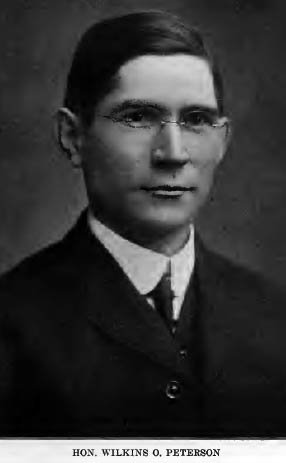Pueblo County, Colorado
HON. WILKINS O. PETERSON

Contributed by Karen Mitchell.
Hon. Wilkins O. Peterson, a prominent attorney of Pueblo and representative
of his district in the state senate, stands at all times for the most
progressive measures in relation to public affairs and is well known as the
author of the bill which made Colorado dry, a work of which he has every reason
to be proud and which will win him higher honors as the years go on and the
country comes to a full recognition of what prohibition means in economic,
sociological and moral benefit. Mr. Peterson is a native son of Colorado, his
birth having occurred at Rye, on the 23d of October, 1876, his parents being
Joseph and Carolina (Peterson) Peterson, who, though of the same name, were not
related. It was in the year 1873 that the family home was established in
Colorado, Joseph Peterson taking up his abode in the state in April of that
year. He was a rancher and stockman and for many years was actively identified
with the agricultural development of the state. He is now making his home with
his son, Wilkins O., his wife having passed away. In the family were but two
children, the brother being Scott R. Peterson, now a resident of California.
In his boyhood days Wilkins O. Peterson was a pupil in the public schools of
his native county and was afterward graduated from the Pueblo Centennial high
school with the class of 1897. For the further development of his education he
entered the University of Colorado, where he won the Bachelor or Arts degree as
a member of the class of 1901. In May, 1901, he represented Colorado in the
interstate oratorical contest held at Des Moines, Iowa, and was awarded first
place in thought and composition on his oration, "The American Farmer." He began
preparation for the bar as a student in the law department of the State
University and was graduated in 1902. In that year he entered upon the practice
of his profession in Pueblo and has since won a place as a successful attorney.
His practice is now extensive and of an important character. He is remarkable
among lawyers for the wide research and provident care with which he prepares
his cases. At no time has his reading ever been confined to the limitations of
the questions at issue. It has gone beyond and compassed every contingency and
provided not alone for the expected but for the unexpected, which happens in the
courts quite as frequently as out of them. He is recognized as a man of broad
legal learning and of analytical mind and the court records bear testimony to
the many favorable verdicts which he has won for his clients. Whatever else may
be said of the legal fraternity, it cannot he denied that members of the bar
have been more prominent factors in public affairs than any other class of the
community. This is hut the natural result of causes which are manifest and
require no explanation. The ability and training which qualify one to practice
law, also qualify him in many respects for duties which lie outside the strict
path of his profession and which touch the general interests of society.
Recognizing his capability, Mr. Peterson's fellow townsmen have at various times
called upon him for public service. In 1909 he became city attorney of Pueblo
and filled the position for two years. He was a member of the charter convention
in July and August, 1911, and 1914 he was elected to represent his district in
the state senate for a four years' term. While in the upper house he handled the
prohibition bill and in conjunction with leaders in the temperance movement
wrote the bill that made Colorado dry.
On the 29th of November, 1906, Mr. Peterson was united in marriage to Miss
Mary Lowrey, of Fort Collins, a daughter of Wesley W. Lowrey, and to them have
been born two children, Joseph L. and Sarah. In social circles of the city the
family occupy a prominent position and the hospitality of their home is greatly
enjoyed by their many friends. Mr. Peterson is deeply interested in all that has
to do with the welfare and progress of his community and is now serving as one
of the directors of the Chamber of Commerce. Fraternally he is connected with
the Masons and with Sigma Nu, a college fraternity, and his religious faith is
indicated by his membership in the Presbyterian church. He stands for all that
is most worth while in life. He is never content to choose the second best but
holds to high ideals of manhood and citizenship and does everything in his power
to promote public progress. Many tangible evidences of his spirit of loyalty and
devotion may be cited and in all of his public work he has looked beyond the
exigencies of the moment to the opportunities, the needs and the possibilities
of the future.
History Of Colorado
Illustrated
Volume II
Chicago
The S. J. Clarke Publishing Company
1918


to the Pueblo County Index Page.

Please e-mail comments and suggestions toKaren Mitchell.
| © Karen Mitchell |





